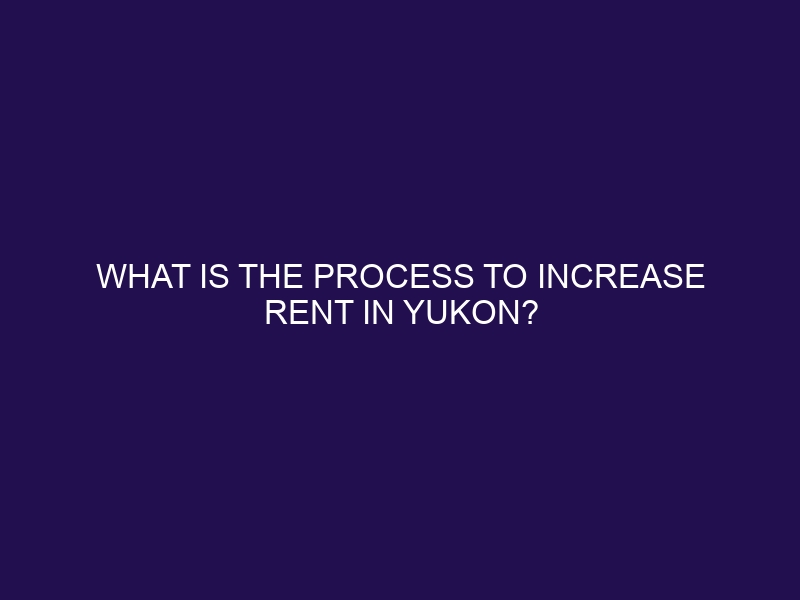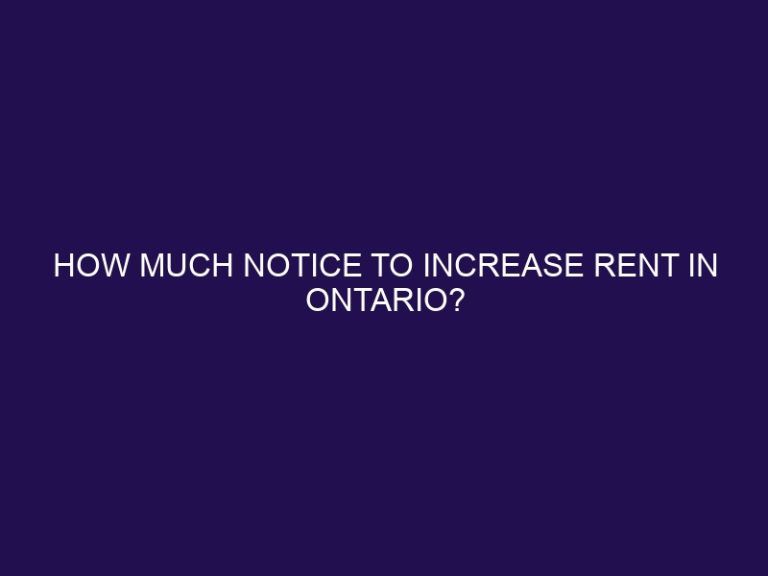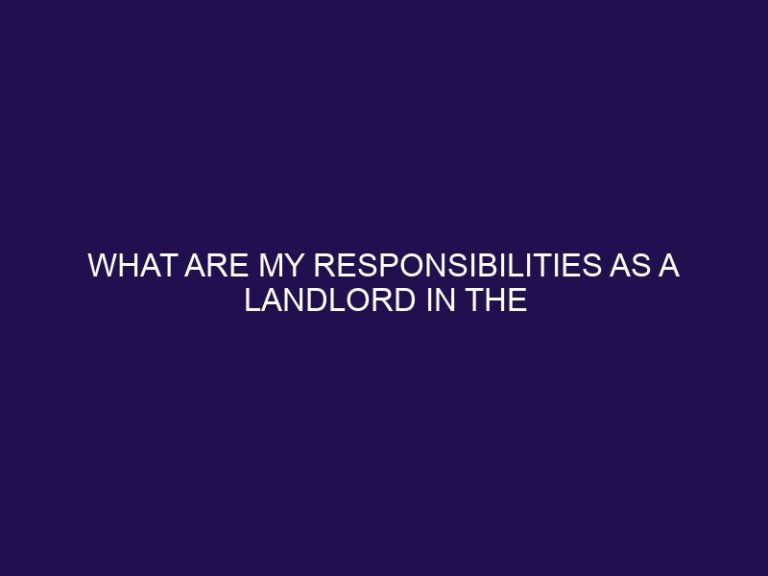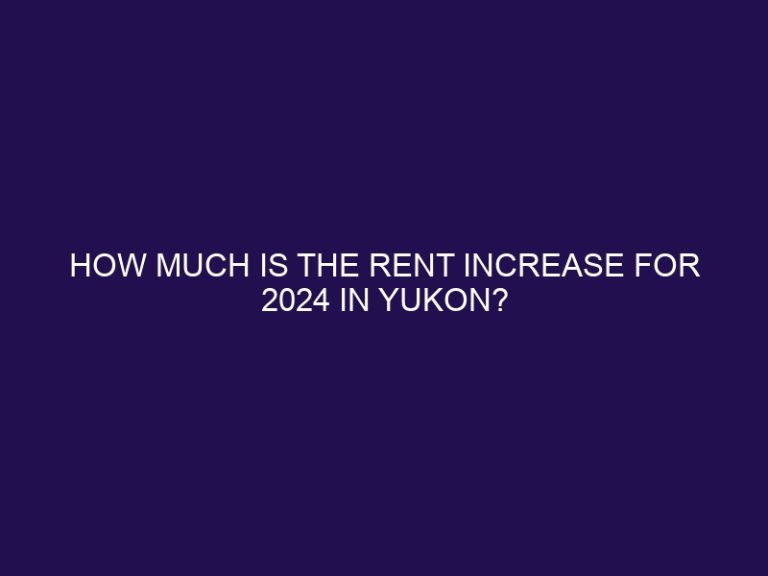What is the process to increase rent in Yukon?
.jpg)
Rent increase is a regulated process in Yukon, and it is essential to understand the guidelines and procedures involved. Yukon has specific regulations in place to protect both landlords and tenants when it comes to rent increases. By following the proper process, landlords can ensure a smooth and legal increase in rent while tenants can be aware of their rights and responsibilities.
The first section of this article will provide an overview of rent increase regulations in Yukon, including the guidelines set by the government. It will also explain the notice requirement for rent increases. it will discuss the factors that landlords should consider before increasing rent, such as current market conditions and property maintenance.
Following that, the article will outline the step-by-step process of increasing rent in Yukon. This includes reviewing the lease agreement, determining the maximum allowable rent increase, providing proper notice to tenants, and establishing the effective date for the rent increase.
Next, the article will address the challenges and limitations of rent increases in Yukon. It will highlight the availability of the Residential Tenancy Dispute Resolution Service for resolving any issues that may arise during the rent increase process. It will also emphasize the importance of protecting tenant rights throughout the process.
Lastly, the article will provide additional considerations for rent increase, including the importance of clear communication with tenants and offering alternatives to rent increase when feasible. By following the guidelines and addressing tenant concerns, landlords can maintain a positive relationship with their tenants while implementing necessary rent increases in accordance with Yukon regulations.
Key takeaways:
- Rent increase process in Yukon: To increase rent in Yukon, landlords must follow specific guidelines and steps. These include reviewing the lease agreement, determining the maximum allowable rent increase, providing proper notice to tenants, and setting the effective date for the rent increase.
- Considerations before increasing rent: Landlords should consider factors such as current market conditions and property maintenance/upgrades before increasing rent. It is essential to ensure a fair and reasonable rent increase that complies with regulations and maintains tenant satisfaction.
- Challenges and limitations: The rent increase process in Yukon is regulated to protect tenant rights. Landlords need to be aware of their obligations and the services available, such as the Residential Tenancy Dispute Resolution Service. Communication with tenants and offering alternative options can help navigate potential challenges in the process.
Rent Increase Regulations in Yukon
In the realm of rent increases, understanding the regulations in Yukon is crucial. In this section, we’ll dive into the rent increase guidelines and the important aspect of delivering a notice of rent increase. So, if you’re curious about the dos and don’ts and want to stay informed about the requirements in Yukon, you’re in the right place. Get ready to discover everything you need to know about rent increase regulations in Yukon!
Rent Increase Guidelines in Yukon
Rent Increase Guidelines in Yukon provide a clear framework for landlords to follow when considering raising rents. Here are some key points to keep in mind:
- Review Lease Agreement: Before increasing rent, landlords should review the terms of the lease agreement to ensure that they have the legal right to do so.
- Determine Maximum Allowable Increase: Yukon has specific rules that limit the amount by which rent can be increased in a given year.
- Provide Proper Notice: Landlords must provide tenants with a written notice of the rent increase at least three months in advance.
- Effective Date: The rent increase becomes effective on the date specified in the notice.
Fact: In Yukon, landlords are required to provide tenants with a three-month notice before increasing rent, allowing tenants enough time to adjust their finances.
Rent Increase Guidelines in Yukon establish a clear framework that landlords should adhere to when contemplating raising rents. It is essential for landlords to first review the terms of the lease agreement to ensure their legal right to increase rent. Moreover, Yukon imposes specific rules that determine the maximum allowable increase in rent for a given year. To comply with the regulations, landlords must provide tenants with a written notice of the rent increase at least three months before it takes effect. Consequently, the rent increase becomes effective on the specified date mentioned in the notice. This ensures that tenants in Yukon have sufficient time to adjust their finances accordingly.
Notice of Rent Increase
Providing a notice of rent increase is an essential step in raising rent in Yukon and complying with the Residential Tenancies Act. As a landlord, it is important to follow the regulations and guidelines set forth.
- According to the regulations, landlords are obligated to give tenants a written notice of rent increase within a specific timeframe, generally three months before the proposed increase becomes effective.
- Content: The notice should contain important information such as the current rent amount, the proposed increase amount, the effective date, and a statement explaining the tenant’s rights to challenge the increase.
- Delivery: The notice should be delivered personally to the tenant or sent through registered mail, and keeping proof of delivery is crucial.
Complying with these procedures is vital to ensure adherence to the regulations and fostering a positive landlord-tenant relationship.
Jane, a landlord in Yukon, learned the significance of issuing a notice of rent increase when she unintentionally raised the rent without proper notice. Her tenant, John, understandably became upset and reported the matter to the Residential Tenancy Dispute Resolution Service. Jane had to go through an extensive process to rectify the situation and provide a proper notice, causing unnecessary stress and additional expenses. This experience taught Jane the importance of adhering to the regulations and promptly giving a notice of rent increase to prevent misunderstandings and disputes.
Factors to Consider Before Increasing Rent
Considering the factors before increasing rent is crucial for landlords in Yukon. In this section, we will dive into two key aspects: current market conditions and property maintenance/upgrades. Get ready to uncover insights on how these elements impact rent adjustments, backed by relevant data from trusted sources. So, if you’re a landlord seeking to make informed decisions on increasing rent, keep reading to gain valuable perspective and make the most out of your investment.
Current Market Conditions
When considering a rent increase in Yukon, it’s essential to take into account the current market conditions. Here are some factors to consider:
- Supply and demand: Assess the availability of rental properties in the area and the number of potential tenants.
- Economic trends: Stay informed about the local economy and any changes that may affect rental prices.
- Comparable rentals: Research the rental rates of similar properties in the neighborhood to determine if an increase is justified.
- Housing market: Understand the overall state of the housing market and its impact on rental prices.
Fact: In Yukon, rental prices tend to be influenced by the demand for housing due to the limited availability of rental properties.
Property Maintenance and Upgrades
Property maintenance and upgrades should be taken into account before considering increasing rent in Yukon. When it comes to property maintenance and upgrades, here is a comprehensive list of factors to consider:
- Regular maintenance: It is essential to ensure that the property is well-maintained by addressing any necessary repairs or upkeep.
- Upgrades: Consider incorporating upgrades to the property, such as enhancing the kitchen or bathroom, to enhance its value and attractiveness.
- Energy efficiency: To attract tenants and reduce utility costs, implementing energy-efficient improvements like insulation installation or upgrading to energy-efficient appliances is crucial.
- Amenities: Justifying a higher rent can be possible by adding desirable amenities such as a gym, laundry facilities, or outdoor spaces.
- Security: Enhancing the security features of the property by installing cameras or improving locks is important to provide a safe living environment.
The Process to Increase Rent in Yukon
Looking to increase rent in Yukon? Stay tuned as we break down the process step by step. From reviewing your lease agreement to determining the maximum allowable rent increase and providing proper notice to tenants, we’ve got you covered. Plus, we’ll discuss when the rent increase will take effect. So, if you’re a landlord in Yukon looking to adjust rents, keep reading for all the essential information you need.
Step 1: Reviewing Lease Agreement
The first step in the process to increase rent in Yukon is to review the lease agreement. This ensures that you understand all the terms and conditions related to rent increases. Here are the steps involved in this process:
- Review the lease agreement thoroughly to determine if there are any specific provisions regarding rent increases.
- Check if there are any restrictions on the timing or frequency of rent increases.
- Verify if there are any requirements for providing notice to the tenant before increasing the rent.
Fact: In Yukon, landlords are required to provide written notice to tenants at least three months before the proposed rent increase takes effect.
Step 2: Determining the Maximum Allowable Rent Increase
- Review the current rent increase guidelines set by the Residential Tenancy Act in Yukon.
- Calculate the maximum allowable rent increase by following Step 2: Determining the Maximum Allowable Rent Increase. This formula considers factors such as the Consumer Price Index and any additional increases allowed by the government.
- Ensure that the proposed rent increase does not exceed the maximum allowable percentage determined in step 2.
- If the proposed increase exceeds the maximum allowable limit, consider alternatives such as improving property conditions or offering additional services to justify the increase.
By following these steps, landlords can determine the maximum allowable rent increase in Yukon and ensure compliance with the Residential Tenancy Act.
Step 3: Providing Proper Notice to Tenants
Providing proper notice to tenants is an important step in the rent increase process in Yukon. Here are the necessary steps to follow:
- Review the lease agreement to ensure that you have the authority to increase the rent.
- Determine the maximum allowable rent increase based on the guidelines set by the Residential Tenancies Branch.
- Step 3: Provide written notice to the tenant, clearly stating the new rental amount, effective date, and reasons for the increase.
- Ensure that the notice is given within the required timeframe, which is usually three full rental months before the increase takes effect.
By following these steps, landlords can provide tenants with proper notice and comply with the regulations in Yukon.
Step 4: Rent Increase Effective Date
“`
The Rent Increase Effective Date is an important step in the rent increase process in Yukon. Here are the necessary steps to follow:
- Review the lease agreement to ensure that it allows for a rent increase.
- Determine the maximum allowable rent increase based on the guidelines set by the Residential Tenancy Branch.
- Provide proper notice to the tenants, following the regulations outlined in the Residential Tenancy Act.
- Step 4: Rent Increase Effective Date, which is typically one year from the last rent increase or the start of the tenancy.
It is essential to adhere to these steps to ensure a smooth and legal rent increase process in Yukon.
Yukon implemented these steps to protect both landlords and tenants in rent increase situations. By establishing clear guidelines and proper notice requirements, the government aims to maintain fair and transparent rent increases while ensuring tenants are not faced with sudden and unaffordable changes in their housing costs.
Challenges and Limitations of Rent Increases
Rent increases can be a tricky business, and in Yukon, there are specific challenges and limitations to keep in mind. In this section, we’ll explore the hurdles faced when attempting to increase rent in the region. From navigating the Residential Tenancy Dispute Resolution Service to understanding the importance of protecting tenant rights, we’ll dive into the factors that impact the process. Get ready to uncover the complexities of rent increases in Yukon!
Residential Tenancy Dispute Resolution Service
The Residential Tenancy Dispute Resolution Service (RTDRS) in Yukon provides a fair and impartial platform for resolving disputes between landlords and tenants. Here are the steps involved in using the RTDRS:
- Submit an Application: Fill out the necessary forms and submit them to the RTDRS office.
- Review and Assessment: The RTDRS assesses the application and assigns a dispute resolution officer to the case.
- Preparation: Both parties gather evidence and documentation to support their case.
- Mediation: The dispute resolution officer facilitates a negotiation between the parties to reach a mutually acceptable resolution.
- Decision: If mediation fails, a hearing is conducted, and the officer makes a legally binding decision based on the evidence presented.
- Compliance: Both parties must follow the decision and fulfill any obligations outlined in the ruling.
By utilizing the services of the RTDRS, landlords and tenants can resolve their disputes without the need for costly and time-consuming legal proceedings.
Protecting Tenant Rights
Protecting Tenant Rights is of utmost importance during the rent increase process in Yukon. In order to ensure the rights of tenants are safeguarded, here are some essential steps to follow:
-
Communicate clearly with tenants about the rent increase, providing comprehensive information on the reasons behind it, as well as any relevant regulations that apply.
-
Offer alternatives to the rent increase, such as lease extensions or additional services, in order to mitigate the potential impact on tenants.
-
Ensure that all necessary legal procedures and timelines are followed when issuing notices and implementing rent increases.
By diligently taking these critical steps, landlords can effectively prioritize the protection of tenant rights and foster a positive landlord-tenant relationship.
Additional Considerations for Rent Increase
When it comes to increasing rent in Yukon, there are some important additional considerations to keep in mind. In this section, we’ll explore two key areas: communication with tenants and offering alternatives to a rent increase. It’s crucial to establish effective lines of communication with tenants in order to address any concerns or questions they may have. Providing alternative options can help foster a positive landlord-tenant relationship. Let’s dive into these important aspects of the rent increase process.
Communication with Tenants
When considering a rent increase in Yukon, effective communication with tenants is crucial. This ensures transparency and maintains a positive landlord-tenant relationship. Openly discussing the reasons for the rent increase can help tenants understand the situation. Landlords should prioritize communication with tenants, ensuring clarity when conveying the details of the increase, including the amount and effective date, allowing tenants ample time to adjust their budgets. Offering alternatives, such as improvements or additional services, within the context of the communication, can demonstrate good faith and show that the landlord values their tenants’ satisfaction. Regular and respectful communication with tenants throughout the process is essential for a successful rent increase in Yukon.
Offering Alternatives to Rent Increase
When considering rent increase in Yukon, landlords can explore alternative options that can benefit both them and their tenants. Offering alternatives to rent increase is a smart approach that can help maintain a positive landlord-tenant relationship.
- Renovation incentives: Instead of raising rent, landlords can offer to make improvements or renovations to the rental property as a way to justify the increase in value.
- Extended lease agreements: Landlords can offer longer lease terms in exchange for keeping the rent at the current rate, providing stability and security for tenants.
- Additional amenities: Landlords can consider adding additional amenities or services to the property, such as laundry facilities or parking spaces, to justify a higher rent.
- Flexible payment options: Offering flexible payment plans or allowing tenants to pay rent bi-weekly instead of monthly can help alleviate the burden of a rent increase.
- Reduced utilities: Landlords can negotiate discounts or include utilities in the rent price to offset the impact of a rent increase.
Some Facts About the Process to Increase Rent in Yukon:
- ✅ Housing agencies, including Yukon Housing Corporation, Kwanlin Dün First Nation, and Grey Mountain Housing Society, have certain exemptions and clauses regarding rent increases. (Source: Our Team)
- ✅ Housing agencies are exempt from providing notice for rent increases if the rent is based on the tenant’s income or the income of the tenant’s household. (Source: Our Team)
- ✅ Non-housing agency landlords can only increase rent once a year after the first year of tenancy. (Source: Our Team)
- ✅ Non-housing agency landlords must give a 3-month written notice before increasing the rent. (Source: Our Team)
- ✅ Non-housing agency landlords cannot unreasonably withhold consent for a tenant to assign or sublet a tenancy agreement. (Source: Our Team)
Frequently Asked Questions
How often can a landlord increase the rent in Yukon?
For non-housing agencies in Yukon, landlords can increase rent once a year after the first year of tenancy.
What is the notice period required for rental increases in Yukon?
In Yukon, landlords must provide a 3-month written notice to tenants before increasing the rent for non-housing agency rental units.
Are housing agencies in Yukon required to give notice for rent increases?
Housing agencies in Yukon, such as Yukon Housing Corporation, Kwanlin Dün First Nation, and Grey Mountain Housing Society, are exempt from providing notice for rent increases if the rent is based on the tenant’s income or the income of the tenant’s household.
Can a non-housing agency landlord unreasonably withhold consent for subletting in Yukon?
No, a non-housing agency landlord in Yukon cannot unreasonably withhold consent for a tenant to assign or sublet a tenancy agreement.
What are the notice requirements for ending a tenancy in Yukon?
The notice periods required for landlords to end a tenancy in Yukon depend on the type of tenancy and the reason for termination. It is recommended to refer to the Residential Landlord and Tenant Act or the landlord and tenant handbook for specific information on ending a tenancy.
Can a housing agency in Yukon end a tenancy without notice?
No, housing agencies in Yukon must serve a full month’s written notice to end a tenancy if the tenant is no longer eligible for a subsidized rental unit, if the tenant has not reported or misrepresented their income, or if the tenant has not reported or misrepresented other eligibility-related information.







